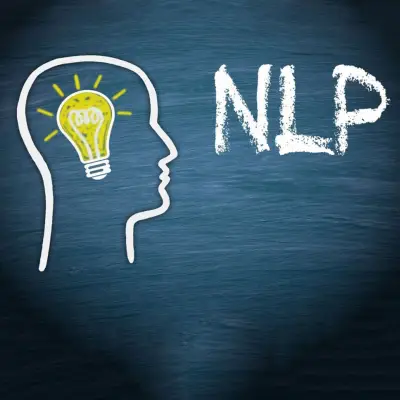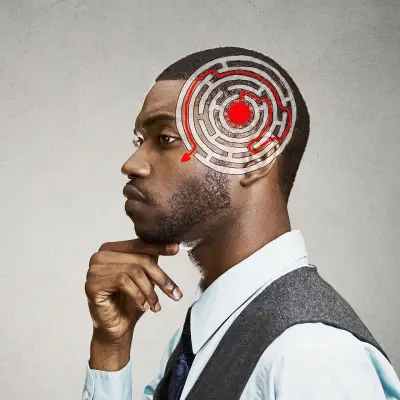In today's fast-paced world, the ability to handle life's ups and downs with strength and grace is more important than ever. Emotional resilience is not just a skill; it's an essential aspect of your mental wellbeing. Whether you're dealing with daily stressors or navigating big life changes, developing emotional resilience will help you live a more balanced and fulfilling life.
Jump to:
What is Emotional Resilience?
Emotional resilience refers to your ability to adapt to stressful situations or crises. It's about bouncing back from challenges and maintaining a positive outlook despite obstacles. People with strong emotional resilience can manage their emotions effectively and use their experiences as a stepping stone for growth.
Recommended for you!
Best SellersWhy is Emotional Resilience Important?
Being emotionally resilient equips you to handle life's uncertainties more effectively. It enhances your ability to cope with stress, overcome adversity, and rebound from setbacks. This benefits your mental health and contributes to your overall quality of life.

What Are The 4 Types of Resilience
Resilience can be emotional, mental, physical, or social. Understanding and developing these different aspects can provide a holistic approach to becoming resilient:
Emotional Resilience
Emotional resilience is about effectively navigating and recovering from emotional distress. It involves the capacity to experience a range of emotions, from joy to sorrow, without letting them dominate your life. Emotionally resilient people can process and express their feelings in a healthy manner, maintain an optimistic perspective even in difficult times, and practice self-compassion. This resilience empowers you to face life's ups and downs with a balanced and hopeful outlook.
Mental Resilience
Mental resilience is the strength of mind that helps you remain focused, flexible, and efficient in the face of stress or adversity. It includes solving problems effectively, adapting to new situations, and maintaining concentration. Mental resilience is about having a clear, sharp mind that can adjust as circumstances change, ensuring you stay mentally agile and resilient, even during turbulent times.
Physical Resilience
Physical resilience refers to your body's ability to withstand and recover from physical challenges. This includes maintaining good health and fitness, managing your energy wisely, and recovering effectively from illnesses or injuries. Physical resilience is also about listening to your body and understanding its needs, ensuring you are as prepared as possible to meet life's demands.
Social Resilience
Social resilience focuses on the strength we gain from relationships and community connections. It involves building and maintaining supportive relationships, effectively communicating needs and listening to others, and engaging with your community. This type of resilience highlights the importance of social support and community involvement in helping navigate life's challenges, providing a sense of belonging and mutual support.
Each of these resilience types plays a vital role in your overall well-being. They interconnect and support each other, creating a comprehensive approach to handling life's challenges and stresses. By developing emotional, mental, physical, and social resilience, you equip yourself with diverse tools to thrive in an ever-changing world.

How to Build Emotional Resilience in 8 Actionable Steps
Building emotional resilience helps you face life’s challenges with a positive attitude and bounce back from setbacks. Here are eight simple yet effective strategies for building emotional resilience:
1. Cultivate a Positive Mindset
Cultivating a positive mindset is essential for emotional resilience. It's about acknowledging the reality of situations while focusing on aspects you can influence positively. Emotionally resilient people see the silver lining in every cloud, navigating through difficulties with a healthier perspective.
Practising gratitude plays a big role here – appreciating what you have rather than what you lack. This approach helps reshape your perspective, allowing you to find lessons and growth opportunities even in challenging times. Adopting this mindset takes practice and patience but can greatly impact how you experience life's ups and downs.
2. Develop Strong Relationships
Relationships that provide emotional support, practical help, and a sense of belonging are invaluable. Such connections could be with family, friends, or members of various community groups. Nurturing these relationships involves open communication, mutual support, and empathy.
Strong relationships create a safety net, so when you fall, you have a network that helps you get back on your feet. Making an effort to maintain these connections, even when life gets busy, is essential for your emotional and social well-being.
3. Embrace Change as a Part of Life
Change is a constant in life; embracing it is a key aspect of resilience. Resisting change can lead to unnecessary stress and anxiety, whereas accepting it can open doors to new opportunities and experiences.
Embracing change involves flexibility and adaptability – understanding that change is often beyond your control, but you have full power over your reaction. It's about viewing change as a chance for growth and learning. Adopting this mindset prepares you to handle life’s transitions more smoothly and with less apprehension.
4. Practice Self-Care
Self-care is about taking care of your physical and emotional needs. This means ensuring adequate rest and sleep, maintaining a nutritious diet, engaging in regular physical activity, and setting aside time for relaxation and hobbies. Taking care of yourself ensures that your body and mind are prepared to handle stress and recover from setbacks more efficiently.
5. Build Problem-Solving Skills
Resilient people often excel in problem-solving. They don't let themselves become overwhelmed by challenges; instead, they approach problems methodically, breaking them down into manageable parts.
Enhancing your problem-solving skills involves practising critical thinking, being open to creative solutions, and approaching issues from various angles. This skill helps resolve immediate problems and equips you to anticipate potential obstacles in the future, preparing you to deal with them more effectively.
6. Set Realistic Goals
Goal setting provides direction and a sense of purpose, keeping you focused and motivated, especially during challenging periods. Setting realistic, achievable goals and working towards them steadily enhances your sense of control and accomplishment. Celebrating small victories along the way is important, as this reinforces your progress and boosts your confidence. Goals give you something to strive for, anchoring you during times of uncertainty and change.
7. Learn from Past Experiences
Reflecting on how you've handled past challenges is a powerful way to build resilience. It allows you to recognise the strengths you exhibited and understand the strategies that worked best for you.
Learning from past experiences also involves acknowledging your mistakes and understanding that they are opportunities for learning and growth. This reflective practice boosts your confidence in handling future challenges and contributes to a deeper understanding of yourself and your capabilities.
8. Seek Help When Needed
It's important to recognise that facing challenges alone isn't always the best approach. Seeking support from friends, family, or professionals can provide new perspectives, resources, and strategies to overcome obstacles.
It also reinforces the idea that everyone needs help sometimes, and there's strength in acknowledging that. You demonstrate a willingness to use all available resources to face challenges by being open to assistance.

Examples of Emotional Resilience
Emotional resilience can manifest in many ways:
- A Business Owner Adapting to Market Changes: Demonstrating resilience by pivoting their business strategy in response to new market trends, economic shifts, or customer feedback, maintaining business stability and growth even in uncertain times.
- A Student Overcoming Academic Challenges: Exhibiting resilience by seeking help, using resources like tutoring or study groups, and maintaining a positive attitude despite setbacks in their academic journey.
- Maintaining Positivity After Personal Loss: Showing resilience by finding ways to honour their loss, seeking support from loved ones, and gradually engaging in life's activities, all while acknowledging their grief and emotions.
- A Professional Handling Job Loss: Reacting resiliently by viewing the situation as an opportunity for career growth or change, actively seeking new opportunities, and using the time to enhance skills or pursue further education.
- A Parent Managing Family and Work Stress: Balancing multiple responsibilities and showing resilience by prioritising tasks, seeking support when needed, and ensuring personal time for relaxation and self-care.
- An Athlete Recovering from Injury: Exhibiting resilience by committing to a rehabilitation plan, staying mentally strong, and focusing on returning to their sport with newfound determination.
- A Community Rebuilding After a Natural Disaster: Coming together to rebuild, support each other, and find collective solutions to challenges, showcasing community resilience in the face of adversity.
- An Artist Overcoming Creative Block: Demonstrating resilience by experimenting with new techniques, seeking inspiration from various sources, and not giving up on their creative dreams despite temporary obstacles.
- A Senior Citizen Adapting to New Technology: Showing resilience by embracing the challenge of learning new technologies, staying connected with family and adapting to the changing world.
Recommended for you!
Best SellersStudy Emotional Intelligence for £29
Are you ready to deepen your understanding and mastery of emotional resilience? Enroll in our Emotional Intelligence Diploma Course, an enlightening journey towards personal empowerment.
What You'll Discover
- Key Insights into Emotional Resilience: Gain a thorough understanding of what emotional resilience truly means and how it can be nurtured and developed.
- Practical Strategies for Resilience: Learn actionable techniques and strategies to build and strengthen your emotional resilience in everyday life.
- Enhancing Overall Wellbeing: Understand how emotional resilience ties in with mental health and overall wellbeing, providing comprehensive benefits for both your personal and professional life.
Special Offer for Your Personal Growth
In our commitment to fostering transformative education, we're thrilled to offer you this comprehensive Emotional Intelligence Diploma Course at a special rate of only £29.













